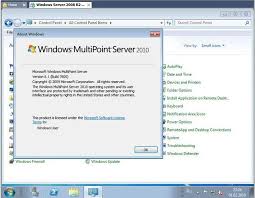Under The Radar? Who’s Talking About Windows MultiPoint Server 2010?
This has certainly flown under the radar for me. I’ve seen most Windows versions, but not this one. Here’s the idea behind MultiPoint Server – say you have a very limited number of computers available to you, but you want provide a number of users each access to a unique desktop experience. Yes, this is similar to Terminal Server – but the big difference here is the physical connection. With a Terminal Server devices can be of any sort, and they connect to the server via the network. Why has this gone so far under the radar? What kind of ways could this technology be used?
With MiltiPoint, devices connect directly to the server. Once such device that connects to the server something like the LG Network Monitor. Windows MultiPoint Server 2010 itself was announced way back in February of 2010, and if you check the link, you’ll see a video embedded that uses the Silverlight plugin (yes, it’s already crashed for me once, I wouldn’t dare embed that here) – instead, I give you the YouTube version of this demo:
1. This is basically a local implementation of a Terminal Server (some would also say an implementation of SteadyState).
2. If you see the above demo, you’ll see that the computer used is an HP RP5700 or similar. This computer dates back to 2007 and is certainly not a powerhouse, so the implication here is that lower-end hardware can run this stuff.
3. The marketing, it appears as though Microsoft has decided to push for this in school environments
So, what else could this be used for?
1. Gaming: This setup would seem perfect for the Multiplayer LAN Starcraft game – I could see a table with eight of these monitors running those eight sessions of the game (sound might be a messy thing).
2. Data Entry: I can see offices that do large scale data entry not needing all the power and infrastructure required by a Terminal Server, but needing the multiple endpoints, monitors, and mice. This would be perfect for data entry.
3. Internet Cafes: In many of the poorer countries I’ve seen, the Internet Cafe is a fixture for locals trying to get on the Internet and is generally low-cost for the users. Most of the proprietors are so cash starved that I have seen some really low-end and cobbled together computers couples with rampant use of Linux (which is great, by the way). But, an option like this would certainly give the cafe owner a way to save even more money in hardware investment.
4. Production Computers: Computers on production floors of manufacturing companies are troublesome to administer. They get dirty, they get bumped around, they endure harsh conditions, and they usually only need to be limited to a few tasks. using this type of technology could end the need for a computer and ease the cost and administrative burden of supporting production floor computers.
5. Dumb Terminal Replacements: Many larger companies still use dumb terminals for lookups to mainframe computers. This technology could certainty make some headway into replacing these limited use devices (and bringing applications into a Windows environment).
You know, I generally consider Microsoft to be a marketing juggernaut, but on this product I wonder why they’re not promoting it more? Are there other ways you can see this Server product being used out there?


